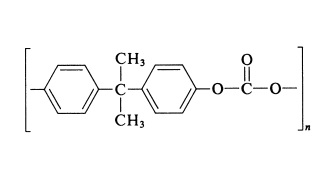Polycarbonate
|
|
|
- CAS-Nr.
- 25037-45-0
- Englisch Name:
- Polycarbonate
- Synonyma:
- POLY(BISPHENOL A CARBONATE);POLYCARBONATE RESIN;Makrolon;CARBONATE RESIN;bisphenol A carbonate polymer;POLYCARBONATE;POLYCARBONATE;POLYCARBONATE;POLYCARBONATE 326;POLYCARBONATE 6'800
- CBNumber:
- CB6236571
- Summenformel:
- C16H18O5
- Molgewicht:
- 290.32
- MOL-Datei:
- 25037-45-0.mol
|
Polycarbonate Eigenschaften
Sicherheit
- Risiko- und Sicherheitserklärung
- Gefahreninformationscode (GHS)
| Bildanzeige (GHS) |

|
| Alarmwort |
Warnung |
| Gefahrenhinweise |
| Code |
Gefahrenhinweise |
Gefahrenklasse |
Abteilung |
Alarmwort |
Symbol |
P-Code |
| H400 |
Sehr giftig für Wasserorganismen. |
Kurzfristig (akut) gewässergefährdend |
Kategorie 1 |
Warnung |
![GHS hazard pictograms]() src="/GHS09.jpg" width="20" height="20" /> src="/GHS09.jpg" width="20" height="20" /> |
P273, P391, P501 |
|
| Sicherheit |
| P273 |
Freisetzung in die Umwelt vermeiden. |
| P391 |
Verschüttete Mengen aufnehmen. |
| P501 |
Inhalt/Behälter ... (Entsorgungsvorschriften vom Hersteller anzugeben) zuführen. |
|
Polycarbonate Chemische Eigenschaften,Einsatz,Produktion Methoden
Chemische Eigenschaften
Polycarbonate is a polyester in which dihydric (or polyhydric) phenols are joined through carbonate linkages. The general-purpose type of polycarbonate is based on 2,2-bis(4'-hydroxybenzene)propane (bisphenol A) and has the general structure:

Polycarbonates are the toughest of all thermoplastics. They are window-clear, amazingly strong and rigid, autoclavable, and nontoxic. They have a brittleness temperature of 135℃.
Verwenden
Polycarbonates are plastics widely used in modern industry having good temperature and impact resistance. This plastic is particularly good to work with more conventional definition techniques (injection molding, extrusion into tubes or cylinders and thermoforming). It is also used when optical transparency is needed, having more than 80% transmission up to the 1560-nm range (short wave infrared range). It has moderated chemical resistance properties, being chemically resistant to diluted acids and alcohols. It is poorly resistant against ketones, halogens, and concentrated acids. The major disadvantage associated with polycarbonates is the low glass transition temperature (Tg> 40°C), but it is still largely used as low-cost material in microfluidic systems and also as a sacrificial layer.
Definition
A
thermoplastic polymer consisting of polyesters
of carbonic acid and dihydroxy compounds.
They are tough and transparent,
used for making soft-drink bottles and
electrical connectors.
synthetische
To a solution of 2,2-bis-(4- hydroxyphenyl)propane 909 (0.68 g, 3 mmol) in dichloromethane (10 mL) was added triethylamine (0.60 g, 6 mmol), followed by a solution of triphosgene (0.30 g,1 mmol) in dichloromethane (10 mL). The mixture was stirred for 8 h at room temperature, washed with water (3×) and with aq. sodium hydrogen carbonate solution (3×), and dried over sodium sulfate. The solvent was removed in vacuo and the resulting colorless powder was dried under high vacuum; yield 0.74 g.
Allgemeine Beschreibung
Service temperature, max.135°C
Polycarbonate Upstream-Materialien And Downstream Produkte
Upstream-Materialien
Downstream Produkte
Polycarbonate Anbieter Lieferant Produzent Hersteller Vertrieb Händler.
Global( 128)Lieferanten
25037-45-0()Verwandte Suche:
- POLYCARBONATE STANDARD 50'000 FOR GPC
- POLY(BISPHENOL A CARBONATE), MELT INDEX 7
- POLYCARBONATE RESIN, SECONDARY STANDARD
- POLYCARBONATE STANDARD 6'800, FOR GPC
- POLYCARBONATE STANDARD 326, FOR GPC
- POLYCARBONATE RESIN, SECONDARY STANDARD, MOLECULAR WEIGHT SERIES
- POLYCARBONATE STANDARD 3'860 FOR GPC
- POLYCARBONATE STANDARD 30'600, FOR GPC
- POLYCARBONATE STANDARD 195'000, FOR GPC
- POLYCARBONATE STANDARD 127'000 FOR GPC
- POLY(BISPHENOL A CARBONATE), MELT INDEX 10-12
- POLYCARBONATE STANDARD 10'400 FOR GPC
- POLY(BISPHENOL A CARBONATE), MELT INDEX 4.5
- POLYCARBONATE STANDARD 1'590 FOR GPC
- 2,2-Bis(4-hydroxyphenyl)propyl polycarbonate
- CARBONATE (POLY) RESIN
- Polycarbonatesof2,2-bis(4-hydroxyphenyl)propane
- POLYCARBONATE
- POLYCARBONATE 195'000
- POLYCARBONATE
- POLYCARBONATE 6'800
- POLYCARBONATE 50'000
- POLYCARBONATE 46000
- POLYCARBONATE 326
- POLYCARBONATE 30'600
- POLYCARBONATE 20'200
- bisphenol-a-polycarbonate
- Carbonicacid,polymerwith4,4’-(1-methylethylidene)bis(phenol)
- carbonicacid,polymerwith4,4’-(1-methylethylidene)bis[phenol]
- Poly[2,2-bis(4-hydroxyphenyl)propanecarbonate]
- POLYCARBONATE
- POLYCARBONATE RESIN, AVERAGE MW CA. 64,0 00 (GPC)
- POLYCARBONATE STANDARD 20'200, FOR GPC
- PolyCarbonateEster(PC)
- 4,4''-Dihydroxydiphenyl-2,2-propane carbonate polymer
- Polycarbonate, flame retarding
- Polycarbonate,colored
- Poly(Bisphenol A carbonate) average Mw ~45,000 by GPC
- Poly(Bisphenol A carbonate) Melt index 10-12 g/10 Min (300C/1.2kg)
- polycarbonate macromolecule
- Polycarbonate (3 Strips, 2'' x 2 1/2'' each)
- Polycarbonate ISO 9001:2015 REACH
- Raw Materials Polycarbonate CAS 25037-45-0 Polycarbonate Granules /Resin Price in Low
- TIANFU-CHEM CAS NO.25037-45-0 POLY(BISPHENOL A CARBONATE)
- CARBONATE RESIN
- POLY(BISPHENOL A CARBONATE)
- POLYCARBONATE RESIN
- bisphenol A carbonate polymer
- Makrolon
- Polycarbonate, enhanced
- Carbonic acid compound with 4,4'-(propane-2,2-diyl)diphenol (1:1)
- Poly(Bisphenol A carbonate), Mn/1000≈4.6
- Poly(Bisphenol A carbonate), Mn/1000≈7.5
- Carbonic acid compound with 4,4'-(propane-2,2-diyl)diphenol (1:1)
- 25037-45-0
- C31H32O7
- Analytical Standards
- Alphabetic

